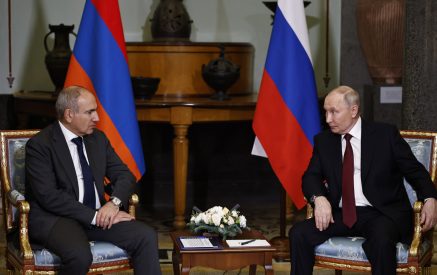Sometimes it seems to me that the main problem in Armenia is the game “What, where, when”, better to say, this is the game that is broadcast in Russian. Therefore, they want to sue the organizers of the game. There are, of course, more “minor” issues. People say that the government is stealing 2.5 billion dollars per year from the annual budget (I believe); all the attention of half of our people living in our country is focused on running away from here (let’s not touch the issue in-depth as to why for, but it is true). From time to time, it appears that we owe Russia something and we still have to give something for the debt. All of these, of course, is a trifle. But, the matter that the game “What, where, when” is played in Russian, it’s a tragedy that would destroy our nation.
Actually, the Armenian language problems, undoubtedly, are extremely important. For example, during his visit, the Russian President Vladimir Putin said that a Russian language specialized school will be opened in Yerevan as a branch of the Moscow University. I have nothing against Moscow University (my father, by the way, is a graduate of this university and fondly remembers the years of study), definitely, we need to find ties of collaboration with this University. But, the school, where teaching will be conducted in a foreign language, firstly, is questionable from legal perspective, and, which is more important, would create seduction among the “elite” to send their children to this and alike “elite” schools, due to which the lack of proficiency of the native and state language would be a sign of special “etiquette.” This was adopted among philistines of the Soviet Armenia until 1988.
Russian officials, who will come here more and more often after September 3, should feel that they have come to another state, where the foreign language proficiency, of course, is highly desired, but not mandatory. (In this respect, it is clear that our officials would not alert their Russian counterparts). Language, if you want, is a hearth of a quiet and peaceful resistance, and the resistance, sometimes, is more influential than going out to the street and holding a poster.
The problem of the language in TV broadcast is also put strictly; there are many channels that obviously violating the law are showing Russian films for several hours a day. For comparison, the game “What, where, when”, with it repetitions, “takes” a total of 48 hours per year, and the Russian language helps us to solve some competitive problems here.
Read also
Consequently, focusing on the intellectual game in the abundance of numerous (including, language) problems is not so much justified.
ARAM ABRAHAMYAN






















































